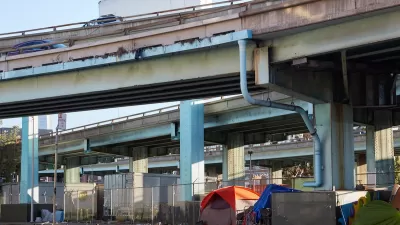An analysis from Denver shows that unhoused people receiving services based on a Housing First approach were more likely to access psychiatric care and had fewer emergency medical visits.

An analysis of supportive housing programs in Denver, Colorado reveals that a Housing First approach, which prioritizes placing unhoused people into housing before imposing other requirements, led to higher rates of doctor visits for mental health diagnoses and prescriptions and lower numbers of emergency room visits among participants.
An article by researchers Devlin Hanson and Sarah Gillespie in Health Affairs outlines part of their results. “Two years after assignment to the Housing First intervention, participants had an average of eight more office-based visits for psychiatric diagnoses, three more prescription medications, and six fewer emergency department visits than the control group.” The two groups had no statistically significant difference in mortality rates.
The authors see these results as an indicator that housing programs can also impact health care provision. “As policy makers seek increased funding to scale up effective ways to address the needs of populations experiencing chronic homelessness, our results provide evidence that supportive housing with a Housing First approach not only can provide a housing solution but also can facilitate engagement in needed health care services.”
FULL STORY: ‘Housing First’ Increased Psychiatric Care Office Visits And Prescriptions While Reducing Emergency Visits

Planetizen Federal Action Tracker
A weekly monitor of how Trump’s orders and actions are impacting planners and planning in America.

Congressman Proposes Bill to Rename DC Metro “Trump Train”
The Make Autorail Great Again Act would withhold federal funding to the system until the Washington Metropolitan Area Transit Authority (WMATA), rebrands as the Washington Metropolitan Authority for Greater Access (WMAGA).

The Simple Legislative Tool Transforming Vacant Downtowns
In California, Michigan and Georgia, an easy win is bringing dollars — and delight — back to city centers.

The States Losing Rural Delivery Rooms at an Alarming Pace
In some states, as few as 9% of rural hospitals still deliver babies. As a result, rising pre-term births, no adequate pre-term care and harrowing close calls are a growing reality.

The Small South Asian Republic Going all in on EVs
Thanks to one simple policy change less than five years ago, 65% of new cars in this Himalayan country are now electric.

DC Backpedals on Bike Lane Protection, Swaps Barriers for Paint
Citing aesthetic concerns, the city is removing the concrete barriers and flexposts that once separated Arizona Avenue cyclists from motor vehicles.
Urban Design for Planners 1: Software Tools
This six-course series explores essential urban design concepts using open source software and equips planners with the tools they need to participate fully in the urban design process.
Planning for Universal Design
Learn the tools for implementing Universal Design in planning regulations.
Smith Gee Studio
City of Charlotte
City of Camden Redevelopment Agency
City of Astoria
Transportation Research & Education Center (TREC) at Portland State University
US High Speed Rail Association
City of Camden Redevelopment Agency
Municipality of Princeton (NJ)





























